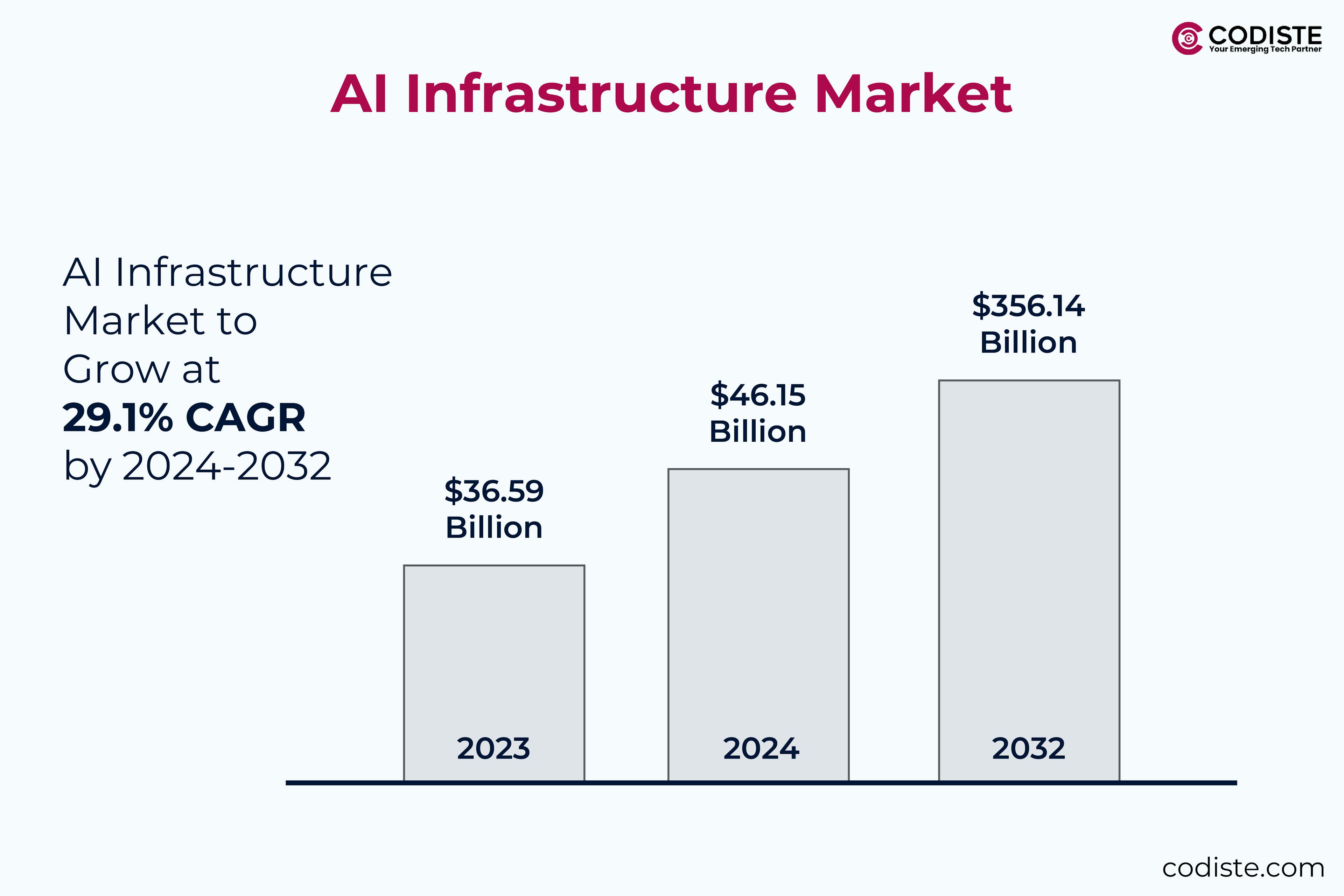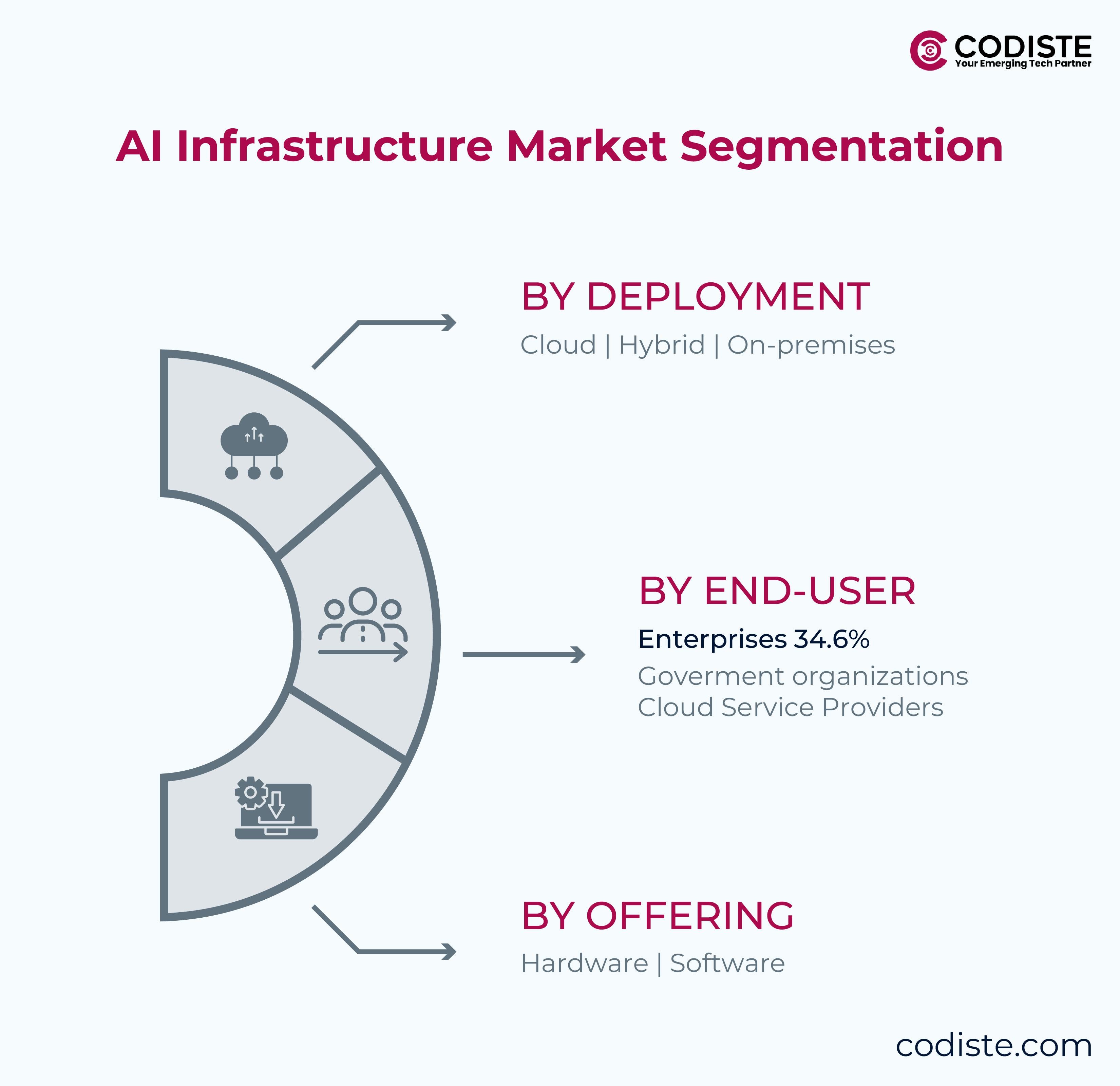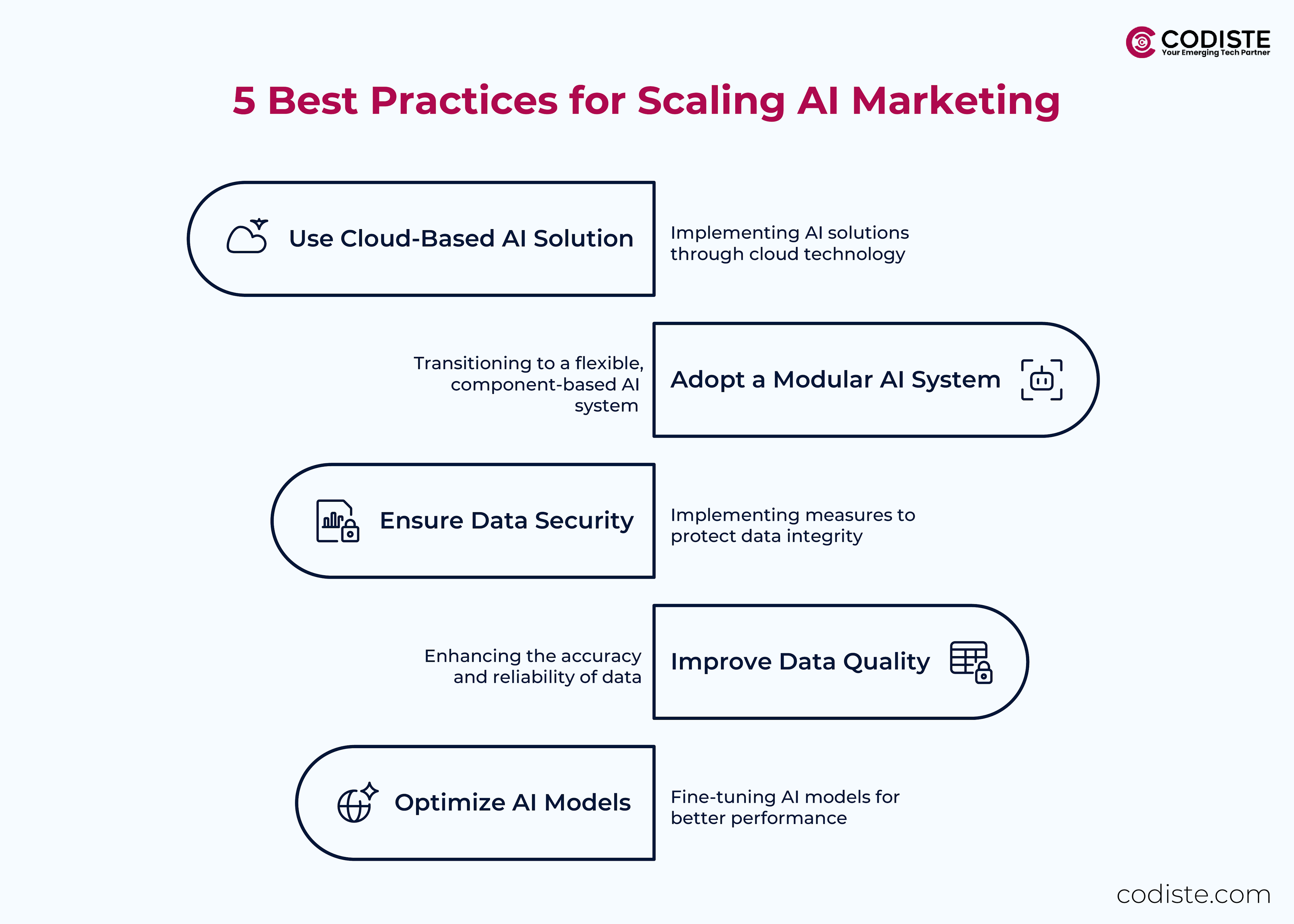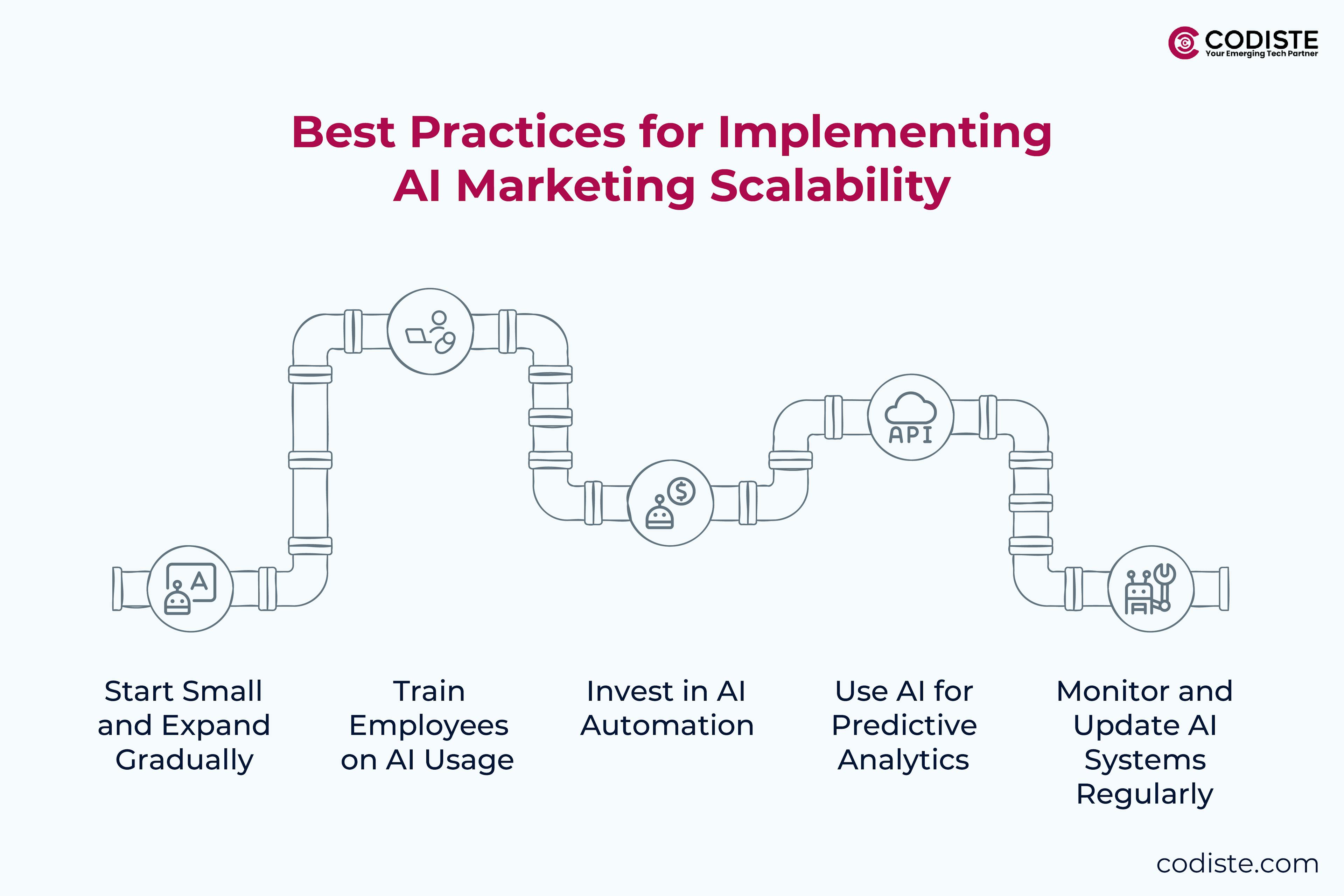
Scaling AI Marketing Infrastructure: Best Practices
Artificial Intelligence has completely changed the way businesses do marketing. It helps companies customize customer interaction, perform tasks automatically, and efficiently analyze data. Machine learning is a key component of AI marketing infrastructure, enabling more precise targeting and personalization. The artificial intelligence infrastructure market was reported to have a value of $356.14 billion in 2032 by Fortune Business Insights, and it is predicted that it will keep on growing.

Increasingly AI is being utilized by companies for marketing and they do that by developing their AI marketing infrastructure. Having a clear AI strategy is crucial to effectively scale AI marketing infrastructure, as it helps in defining specific objectives, tracking progress, and demonstrating the return on investment. Scaling means that AI systems must be improved to manage more data, streamline task automation and make the business smarter. The businesses that introduce new AI features will be able to create improved marketing messages, save time, and gain higher engagement with customers.

Deployment, End-user, and Offering segments the cloud security market. As shown in the image deployment options include cloud, hybrid, and on-premises solutions. Enterprises are the largest segment at 34.6%, followed by government organizations and cloud service providers. Additionally, the market includes hardware and software components both.
Why is Scaling AI Marketing Infrastructure Needed?
1. More Customer Data
The gathering of customer data from websites, social media, emails, and other sources by modern businesses is currently standard practice. The AI technology then took over to process of the big data to create more relevant marketing strategies. Nevertheless, as companies grow, their AI systems also need to become larger and faster to handle huge datasets effectively. Selecting the right AI tools can help manage and process these large datasets efficiently, ensuring seamless integration within existing systems.
2. Better Personalization
Customers expect a custom approach to marketing. With AI, companies can provide consumers with product recommendations, personalized marketing messages, and custom ads. A scalable AI marketing system ensures companies can offer personalized experiences to millions of clients on time.
3. Keeping Up with Competition
AI marketing infrastructure is the focus of a lot of businesses now. The companies that refuse to grow their AI systems are more likely to be left behind their competitors who use AI-driven knowledge to upgrade marketing and customer interactions. Companies that successfully scale AI can gain a competitive edge by innovating and differentiating in the marketing field.
4. Cost Reduction
Businesses can automate email marketing, customer segmentation, and chatbots with AI marketing infrastructure leveraging AI's ability to automate tasks. This results in less manual work and as a result, time and costs are saved.
5. Adapting to New Technology
Marketing is constantly changing. AI marketing architecture must be designed in such a manner as to be able to accommodate new AI tools such as machine learning (ML), big data, and cloud computing.
Challenges in Scaling AI Marketing Infrastructure
AI architecture scaling comes with a couple of challenges that businesses must address. Some of them are:
1. Managing Large Data Sets
The collection of more data by companies makes it a daunting task to organize and manage. Incorrect AI predictions and poor marketing campaigns can happen with poor-quality data.
2. Infrastructure Limitations
AI requires strong infrastructure such as powerful servers and cloud computing solutions. The companies could even face slow AI processing times and system failures when the resources are not enough, making cloud solutions a necessary component to avoid these issues.
3. Compatibility with Existing Systems
Many companies are employing several marketing tools. Integrating AI tools with these systems can be a tough and slow job that may require more time and funds.
4. High Implementation Costs
Investing in software, cloud solutions as well as AI experts is necessary to broaden AI marketing infrastructure. A good number of companies might find it difficult to scale their AI capabilities due to the financial burden.
5. Data Privacy and Compliance
States have strict rules about data privacy. During the gathering of and checking customer data, the business leaders must guarantee that AI systems are following regulations like GDPR and CCPA to not get into any legal problems.
Looking for expert guidance on AI-driven marketing infrastructure?
Best Practices for Scaling AI Marketing Infrastructure
Without any doubt, Scaling AI marketing infrastructure needs a strategic blend of technical expertise and data insight. Below are some best practices for AI marketing scalability.
1. Use Cloud-Based AI Tools and Solutions
Marketing infrastructure scaling through cloud computing has become much easier. Cloud service providers including AWS, Google Cloud, and Microsoft Azure make it possible to use AI in a manner that is cost-effective and flexible. Cloud-based AI marketing solutions that pay-per-use mean that the companies are free of costly servers and can instantly grow their AI infrastructure. These solutions also help businesses scale AI more efficiently, encouraging marketers to embrace and implement AI technologies within their organizations.
2. Improve Data Quality
AIs are dependent on accurate data to make smart decisions. Businesses are responsible for the cleanliness and organization of their data regularly. The deletion of repeated and incorrect data gives AI the ability to provide better advice and better marketing campaigns.

3. Optimize AI Models
The optimization of AI models has primarily been focused on their efficient functioning. Apart from model compression techniques, businesses can do fine-tuning to optimize AI’s performance. Optimized AI models can do data processing with higher speed and fewer computers.
4. Adopt a Modular AI System
The upgradation of a modular AI system is quite simple and straightforward. By enabling AI developers to add new features to the existing AI system, businesses do not need to re-engineer the entire system again.
5. Ensure Strong Data Security and Compliance
If businesses scale their AI-driven marketing infrastructure it should not weaken their security. Businesses should follow the encryption, access control and compliance framework approach to safeguard data privacy. A company's guaranteed security builds customer confidence in the various business models and AI-driven marketing solutions.
How Businesses Can Implement AI Marketing Scalability Best Practices?
1. Start Small and Expand Gradually
Businesses need to experiment with AI marketing tools on a small scale before implementing them company AI forward organization-wide. Doing this may expose possible issues promptly, which in turn, helps to prevent unnecessary loss of money. Having a clear AI strategy is crucial for gradual expansion, ensuring that specific objectives are met and progress is effectively tracked.
2. Train Employees on AI Usage
AI technology is essential for business courses and employees to be aware of to do their jobs efficiently. Businesses should introduce training programs in artificial intelligence in marketing to teach employees the advantages of AI technologies.

3. Invest in AI Automation
AI automation often performs advanced forms of data analysis, content generation, and personalized communications. The businesses will then have the advantage of producing personal insights and innovative approaches, as well as letting their staff members concentrate on more strategic matters.
4. Use AI for Predictive Analytics
AI can anticipate customer behavior and ongoing trends in the market. Companies need to use AI-driven predictive analytics to map out marketing strategies, find the correct audience, and enhance sales.
5. Monitor and Update AI Systems Regularly
AI is a fast-growing field. Companies should upgrade AI models and marketing tools frequently to make sure they are still effective. They can remain competitive if they always watch for changes and make improvements.
Conclusion
The demand for AI marketing infrastructure that is scalable is the primary need for any business to remain competitive in the digital age. For example, AI-powered tools enable companies to process large amounts of data to customize marketing campaigns and automate tasks accurately. Nonetheless, companies must also handle some difficulties like expenses that are too high, concerns related to data privacy, and problems with system integration.
Companies can successfully scale their AI marketing infrastructure by following the best practices like cloud-based AI coverage, improving data quality,y and using AI automation. AI marketing scalability strategies are one of the ways businesses become more effective in marketing. To stay in the competition in the marketplace, businesses can hire AI Development Companies who have expertise in developing scalable AI marketing solutions. Codiste is one of those AI development companies, having years of experience in scaling AI marketing infrastructure. Contact our experts to discuss your infrastructure growth strategy.



The Future of AI Automation: Agentic RAG...
Know more
The Role of Agentic RAG in the Search, D...
Know more
Is Business Process Automation possible ...
Know more
